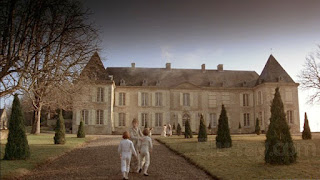Directed
by Ridley Scott; produced by David Puttnam
Armand
d’Hubert (Keith Carradine), a young staff officer in Napoleon’s army, has the
unenviable task of summoning a fellow officer, Gabriel Feraud (Harvey Keitel), to
a disciplinary interview with their general. Feraud, angered at what he
perceives to be the injustice of the message, conceives an immediate dislike
for the messenger and, despite the subject of his summons being the duel he
fought that morning, challenges d’Hubert there and then to another duel. Thus
begins a sixteen-year saga of obsession and combat, as Feraud and d’Hubert
fight a battle whenever they meet. Only the death of one gentleman – or of both
– will end their ordeal.
Those
who know director Scott from his science fiction works (eg. Alien, Blade Runner) or his action
flicks (eg. Black Hawk Down) might be
surprised that his first feature film was this historical drama, a small epic,
based on a Joseph Conrad story. That story was itself based, remarkably, on
truth: the twenty year running duel between two French Army officers. And while
Scott went on to direct excellent movies, including others with historical
subjects (eg. Kingdom of Heaven), The Duellists must remain one of his
best.
The
first thing one notices is the film’s beauty. Undoubtedly, Scott and his
cinematographer, Frank Tidy, were inspired by the paintings of the late
classical era. Outside scenes resemble landscapes, interior shots still-lifes
and portraits. The colours are rich and the textures are almost palpable. The
lighting is that of a worker in oils as much as a director of celluloid.
The
illusion of time and place is aided immeasurably by the detail. The costumes,
especially, are exacting and realistic, to which close-ups will testify. The
sets are also true to life; they should be: to limit his budget Scott used
existing structures.
The
casting might seem very odd. Two American actors, Keitel particularly familiar as
rough, urban men, could at first come across as misplaced. This is not borne
out by their performances. The Al Pacino film Looking for Richard demonstrated to me for the first time, even
though it was a documentary, that Americans could effectively portray
Shakespearean characters, even using their every-day accents. The Duellists does the same for
Americans playing Europeans of a couple of centuries ago. Ability and a good
script will do much in the way of credibility. In this case, they are assisted
by the fact that the French revolutionary army, and its successor, Napoleon’s
army, were filled with officers, indeed, generals, whose humble origins would
have kept them privates or corporals in the old royalist army.
Backing
up the leads are a host of excellent actors, mainly in small roles (Robert
Stephens, Tom Conti, Albert Finney, Edward Fox, Pete Postlethwaite (in his first role, a
non-speaking bit as a valet shaving Stephens) and Stacy Keach as the narrator).
The
characters are, perhaps, the weakest element of the movie. Of Keitel’s, we
learn almost nothing, though that in itself may tell us something. We see him
living for his duels; one of the few times we view him doing something else, it
is arm-wrestling, and even here, he demands a re-match when he loses to a
comrade. There are moments of note, however, as when Feraud, at a low point in
his fortunes, watches, as if for no reason, a dog tied to the back of a cart,
forced to trot along to someone else’s commands. Carradine’s d’Hubert is more
rounded: he is, really, an introvert, content with a few friends, astounded,
and appalled, by his growing fame as a ‘man of reputation’, a ‘fire-eater’, a
fearsome duelist. A conscientious officer, he is just as happy in peaceful
domesticity.
The
direction, aside from the settings and backgrounds, is spot-on. Interspersed
with calm, almost still moments – a dinner in a tavern, a couple speaking
quietly of home matters – are the duels, some precise and quick, others brutal
and exhausting.
As
an historian – one who is constantly complaining of inaccuracy in films – I found
nothing about which to complain in The
Duellists. The writer paid attention to military processes and habits. The
weapons and uniforms in particular are given attention: d’Hubert and Feraud are
both officers of hussars (a type of light cavalry) but, belonging to different
regiments, their garments are similar with differences. These change through
the years, the tall shako, for instance, giving way to the taller fur busby. The
passing time is shown, in fact, more by fashion than by anything else, as we
watch the action
span the years of Napoleon’s rule, taking the characters from rural France to
frozen Russia. There is no concession to modern sensibilities in The Duellists (it was made in 1977,
after all): people here act as they would have in the early nineteenth century.
Whether
one watches The Duellists for its
history, its action, its beauty or its breadth of romance (in the wider,
original meaning of the word), this movie will satisfy most. It is one of the
best works from one of the best directors.









I'm so glad you reminded me of this movie! I remember seeing it when it was first released, and just loved it. The ending, in particular, really got to me. I'll watch it again today, if I can find it online.
ReplyDeleteNot meaning to be punny, but I'm glad it passed muster. For someone such as myself, I wouldn't notice the inconsistencies but I"m sure it's frustrating for you when they appear.
ReplyDelete